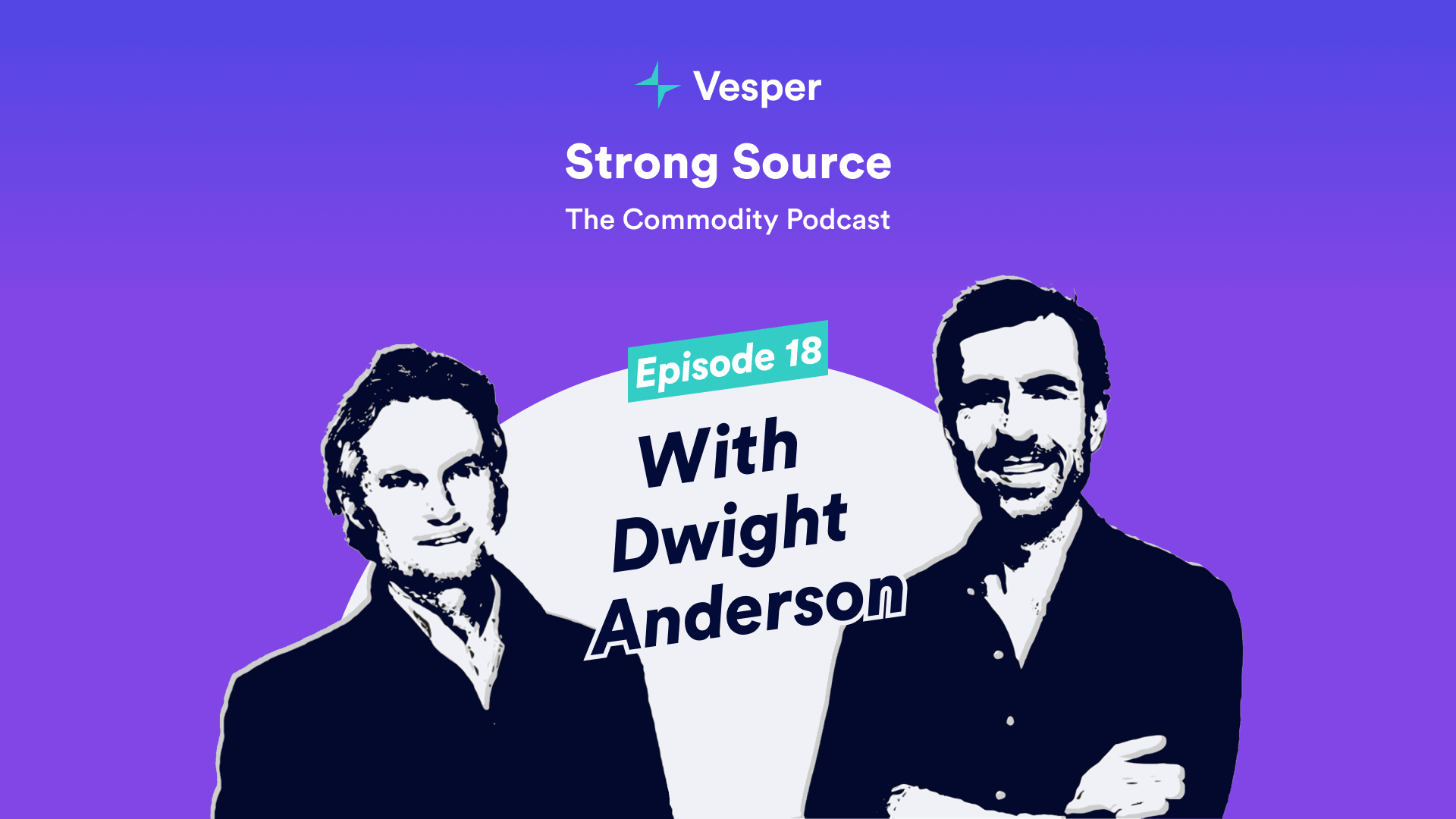The latest Strong Source Commodity Podcast features an exclusive conversation with Dwight Anderson, founder of Osprey Capital Management and a true legend in the world of commodity trading. From his early days at Tiger Management under Julian Robertson to working alongside Paul Tudor Jones, Dwight shares his fascinating journey through hedge funds, risk management, and world of commodities.
In this episode, hosts Martijn Bron, ex-trader at Cargill and Alexander Sterk, founder and CEO of Vesper, dive deep into Dwight’s trading philosophy, his thoughts on the impact of algorithms on commodity markets, and the mental resilience needed to navigate high-pressure trading environments.
Who is Dwight Anderson?
Dwight Anderson is the founder and CEO of Osprey Capital Management, a hedge fund specializing in commodities and basic industries. He started his career at Tiger Management, one of the most successful hedge funds in history, and later worked at Tudor Investment Corp before launching his own firm. Known for his deep expertise in grains, oilseeds, cocoa, and metals, Dwight has built a reputation for long-term, fundamentally driven investing.
How Dwight Anderson Got into Commodities
“I was a history major, had no clue what I wanted to do, and almost became a lawyer. But fate led me to manufacturing consulting, which ultimately got me into commodities.”
Unlike many on Wall Street, Dwight didn’t come from a traditional finance background. Instead, his experience in manufacturing and consulting helped him develop a deep understanding of industrial supply chains—a crucial edge when he transitioned to commodity trading.
The Reality of Wall Street vs. Commodity Trading
“In equities, you can buy and hold, and you’ll probably do okay. But in commodities, there’s no safety net—it’s a zero-sum game where you’re competing against the best traders in the world.”
According to Dwight, commodity trading is more intellectually challenging than traditional stock market investing. Unlike equities, where long-term appreciation is common, commodity markets are driven by supply and demand fundamentals, global macro trends, and unpredictable external shocks.
Working with Legends: Julian Robertson & Paul Tudor Jones
“Julian Robertson was a genius at identifying great people. Paul Tudor Jones, on the other hand, had this incredible ability to instantly grasp a market’s dynamics and ask the toughest, smartest questions.”
Dwight shares inside stories of working at Tiger Management and Tudor Investment Corp, explaining how these legendary investors shaped his trading philosophy and risk management approach.
Surviving the 2008 Financial Crisis
“Managing risk is more important than making money. The biggest lesson from 2008? Size your positions correctly, maintain liquidity, and know when to cut losses.”
During the 2008 financial crisis, Dwight made the difficult decision to liquidate positions early, avoiding the catastrophic losses that hit other funds. He emphasizes position sizing, liquidity, and adaptability as the most important skills in trading.
The Impact of Algorithms & AI on Commodity Trading
“Markets today are dominated by systematic trading. AI and algorithms create larger price swings, but also more opportunities for fundamental traders who understand the bigger picture.”
Dwight discusses how quant funds like Citadel and Two Sigma have changed commodity trading by dominating short-term price movements. However, he believes that fundamentals still drive long-term trends, and traders who can combine data-driven insights with deep industry knowledge will continue to have an edge.
Advice for Aspiring Commodity Traders
“Integrity, work ethic, and judgment are the three most important traits. Intelligence alone isn’t enough—you need to have the discipline to keep learning and the humility to admit when you’re wrong.”
For those looking to break into commodity trading or hedge funds, Dwight emphasizes:
✅ Integrity: Be honest and transparent.
✅ Work Ethic: Success comes from grinding through the details.
✅ Judgment: The best traders have an intuitive sense of risk and opportunity.
Interesting Q&A Excerpts from the Podcast
Q: What drives you in trading?
A: “The intellectual challenge. If you’re given enough data points, you can figure out patterns and gain an edge. That competitive aspect keeps me going.”
Q: How do you handle stress and risk in trading?
A: “If a position keeps you up at night, it’s too big. The key is to size your trades appropriately so you can withstand volatility and still be there when the fundamentals play out.”
Q: How has the role of hedge funds changed in commodity markets?
A: “Fifteen years ago, hedge funds were major players in setting commodity prices. Today, systematic funds dominate short-term moves, but fundamentals still dictate long-term price direction.”
Q: What’s your biggest lesson from 2008?
A: “Never underestimate liquidity risk. Being right on fundamentals doesn’t matter if you can’t survive the short-term moves.”
Why This Episode is a Must-Listen
This episode offers a rare glimpse into the mind of a hedge fund veteran, revealing the realities of trading, risk management, and market evolution. Whether you’re a commodity trader, investor, or just someone fascinated by financial markets, Dwight Anderson’s insights are invaluable.
Listen to the full episode here.



